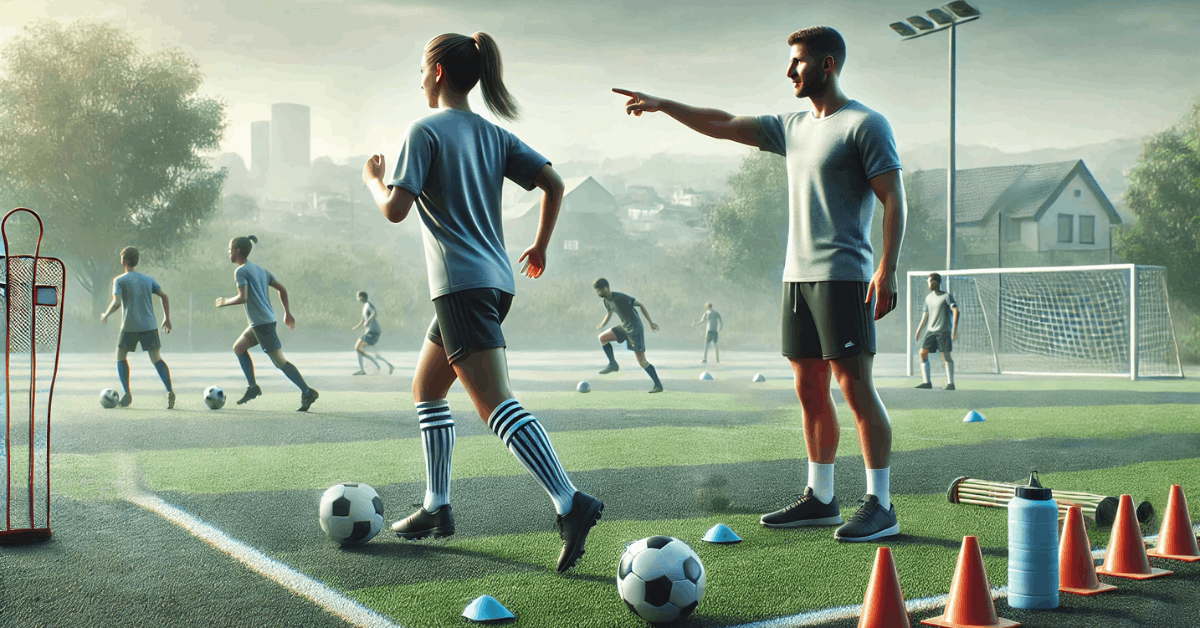
Mental toughness in soccer is what separates good players from great ones. This article outlines key strategies to help you stay focused on the field, even in high-pressure moments.
By mastering these mental skills, you can enhance your performance and contribute more effectively to your team. Focus and resilience are just as important as physical ability in achieving success on the pitch.
What is Mental Toughness in Soccer?
It is the ability to stay calm and focused under pressure. It helps athletes handle challenges and keep a strong mindset during demanding games.
Definition of Mental Toughness
It is the capacity to push through obstacles while maintaining a positive attitude. Like a tight game, it lets players stay calm and composed during stressful moments.
This trait includes staying focused, blocking distractions, and being mentally flexible. Mentally tough athletes also consistently perform regardless of external pressure, which is vital for those who want to thrive in competitive sports.
Attributes of Mentally Tough Players
Mentally tough players share several common traits that set them apart:
- Resilience: Ability to bounce back from mistakes and keep playing hard.
- Confidence: Trust in their skills, even during difficult situations.
- Composure: Staying calm under stress and avoiding emotional reactions.
- Focus: Ability to concentrate on the game and block out distractions.
- Consistency: Delivering the same performance, no matter the circumstances.
Examples of Players with Mental Toughness
Many top players are known for their mental toughness on the field:
- Cristiano Ronaldo: Known for his relentless drive and ability to perform under pressure.
- Lionel Messi: His calmness and consistency have made him one of the best players.
- Megan Rapinoe: Famous for her composure and leadership in critical moments.
- Sergio Ramos: His resilience and confidence are key to his defensive success.
- Sam Kerr: Displays mental strength by staying focused and performing in high-stakes matches.
The Role of Focus in Soccer
Focus is essential for any player to perform at their best. It helps you stay sharp and make quick decisions during the game.
Why Focus is Critical on the Field?
Focus allows you to react quickly to changing game situations. You can read the game better and anticipate the next move when focused. Players who maintain their focus are less likely to make careless mistakes.
It also ensures you can block distractions like crowd noise or opponent pressure. Ultimately, focus helps keep your mind and body in sync.
Impact of Losing Focus
When focus slips, performance suffers. You may miss a critical pass or fail to defend correctly, leading to scoring opportunities for the other team. Losing focus can affect the whole team dynamic, disrupting the flow of play.
It’s also harder to bounce back after mistakes if you can’t regain your concentration. Staying focused helps you recover from errors and remain in the game.
Mental and Physical Demands of the Game
Soccer is demanding both mentally and physically, requiring constant concentration. Players must multitask, making fast decisions while controlling the ball and monitoring teammates. Physical fatigue can also challenge your mental focus.
Regular training helps build the stamina needed to stay sharp for 90 minutes. Managing these demands is critical to consistent performance.
Common Distractions on the Field
Distractions can come from both outside and within and affect performance. Recognizing them is the first step to staying focused.
External Distractions
External distractions come from the environment around the game:
- Crowd Noise: Loud fans can disrupt focus.
- Opponent Tactics: Trash talk or fouls to break your concentration.
- Weather Conditions: Rain, heat, or wind, making play difficult.
- Referee Calls: Unfavorable decisions causing frustration.
- In-game Delays: Breaks that slow down momentum.
Internal Distractions
Internal distractions come from the mind and body:
- Fatigue: Tiredness affecting concentration.
- Negative Self-talk: Doubts that lower confidence.
- Frustration: Emotions from mistakes breaking focus.
- Overthinking: Focusing too much on past errors.
- Emotions: Letting feelings interfere with the game.
How Professionals Manage Distractions?
Top players manage distractions through control and focus techniques:
- Pre-game Routine: Creating mental preparation habits.
- Focus on Task: Block out external noise and focus on the following action.
- Breathing: Using controlled breaths to stay calm.
- Positive Reinforcement: Reminding yourself of successful moments.
- Staying Calm: Remaining unfazed by what’s happening around you.
Strategies to Build Mental Toughness
Specific techniques can help improve focus and resilience during games. These methods can be practiced to boost performance.
Visualization Techniques
Visualizing success prepares you mentally for crucial moments:
- Picture Success: Rehearse the right moves in your mind.
- Pre-Game Visualization: Imagine the field and your actions.
- Scenario Planning: Mentally replay past moments and how you’d improve.
- Calm in Pressure: Visualize staying composed during crucial moments.
- Detail Focus: Imagine every small action you’ll take.
Goal Setting
Breaking down your objectives into smaller goals keeps focus sharp:
- Short-Term Goals: Set targets for each game.
- Process Goals: Focus on improving skills, not just outcomes.
- Daily Goals: Use each practice to build consistency.
- Post-Game Evaluation: Review how well you met your goals.
- Long-Term Goals: Aim for more significant milestones throughout the season.
Mindfulness Training
Mindfulness keeps you in the moment and focused on the current play:
- Stay Present: Focus only on what’s happening now.
- Breathing Control: Use slow, deep breaths to stay calm.
- Body Awareness: Feel how your body moves and reacts.
- Observe Without Reacting: Notice distractions without letting them affect you.
- Reset Focus: Bring your mind back to the game.
Positive Self-Talk
Replacing negative thoughts with affirmations keeps you confident:
- Confidence Boost: Replace doubt with reminders of your abilities.
- Simple Phrases: Use quick cues like “Stay calm.”
- Encourage Yourself: Mentally push yourself forward in tough moments.
- Reflect Positively: After games, focus on what you did well.
- Instant Recovery: Immediately replace negative thoughts with positive ones.
Stress Management
Managing stress helps maintain focus under pressure:
- Breathe Deeply: Use controlled breathing to reduce nerves.
- Routine: Stick to pre-game habits to stay calm.
- Focus on Control: Concentrate on what you can control.
- Stay Positive: Focus on the next opportunity, not the pressure.
- Reset: Use game breaks to recharge and refocus mentally.
Staying Focused Under Pressure
Remaining calm and composed during high-pressure moments is essential. Here’s how to keep your focus when the pressure builds.
How to Remain Composed During Critical Moments?
Here is what you can do.
- Stay Calm: Use deep breathing to reset your mind.
- Focus on the Present: Block out past mistakes and focus on the next move.
- Visualize Success: Imagine yourself handling the situation calmly.
- Trust Your Training: Rely on your preparation and instincts.
- Stay Positive: Keep a positive outlook, no matter the pressure.
Techniques for Controlling Emotions When Things Go Wrong
Emotions can cloud judgment, especially when things don’t go as planned:
- Breathe Deeply: Use slow breaths to control frustration.
- Reset After Mistakes: Quickly refocus after an error.
- Stay in Control: Don’t let referee decisions or fouls trigger emotions.
- Focus on What’s Next: Shift attention to the following action, not the setback.
- Self-Talk: Use positive words to calm and refocus.
Maintaining Focus During Long Games or Extra Time
Staying sharp through extended play requires mental discipline:
- Pace Yourself: Conserve energy and stay mentally fresh.
- Break It Down: Focus on small segments of the game, one play at a time.
- Stay Hydrated: Proper hydration helps maintain focus.
- Reset at Breaks: Use any pauses to refocus mentally.
- Stay Engaged: Constantly remind yourself of your role and goal.
Mental Toughness Off the Field
Mental resilience isn’t just built during games. Training and lifestyle habits play a big part in staying mentally strong.
Building Mental Resilience During Training
Training your mind is as essential as physical training:
- Simulate Pressure: Practice under pressure to improve focus.
- Consistency: Train regularly to build mental endurance.
- Set Clear Goals: Make each practice session purposeful.
- Challenge Yourself: Push limits to build resilience.
- Evaluate Progress: Reflect on what you’ve achieved after training.
How Lifestyle Choices Affect Mental Toughness?
Your daily habits have a significant impact on your mental strength:
- Good Nutrition: Eat balanced meals to fuel your brain.
- Proper Sleep: Getting enough rest keeps you mentally sharp.
- Recovery Time: Take time to relax and reset.
- Hydration: Stay hydrated to maintain energy and focus.
- Healthy Routine: Build consistent, healthy habits to support mental focus.
Importance of Off-Field Preparation for On-Field Focus
Off-field preparation plays a significant role in keeping focus during games:
- Study the Game: Review plays, opponents, and strategies.
- Mental Conditioning: Use mindfulness and visualization off the field.
- Plan Ahead: Prepare mentally for all possible outcomes.
- Physical Fitness: Stay in peak condition to handle mental challenges.
- Recovery Routines: Use rest days to reset and refocus.
Coaching Mental Toughness
Coaches help players develop mental strength by teaching focus and resilience. They guide players through challenging situations to build mental toughness.
Role of Coaches in Developing Mental Toughness
Coaches shape mental strength through support and discipline:
- Set High Standards: Expect players to push their limits.
- Promote Focus: Help players stay sharp in distractions.
- Build Resilience: Teach players to recover quickly from mistakes.
- Encourage Accountability: Players learn to take responsibility for outcomes.
- Create Challenges: Use tough drills to mimic pressure.
Techniques for Fostering a Mentally Tough Environment
Coaches can create a mentally challenging environment:
- Simulate Pressure: Run drills under stress.
- Reward Effort: Focus on improvement, not just winning.
- Consistent Feedback: Give clear, regular guidance.
- Encourage Self-Talk: Reinforce positive thinking.
- Model Calmness: Show resilience during setbacks.
Wrapping Up: Key Insights on Mental Toughness in Soccer
In conclusion, developing mental toughness is essential for staying focused and performing at your best on the field. Players can handle pressure more effectively by applying strategies like visualization, goal setting, and managing distractions.
Mental preparation is as essential as physical training, helping athletes remain composed during critical moments. Remember, mastering mental toughness in soccer can significantly boost individual and team performance.






